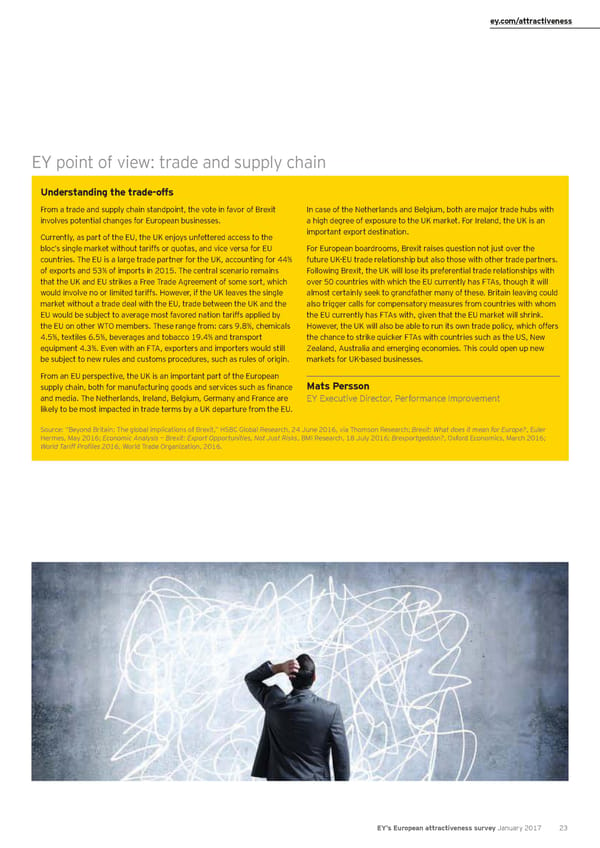ey.com/attractiveness EY point of view: trade and supply chain Understanding the trade-offs From a trade and supply chain standpoint, the vote in favor of Brexit In case of the Netherlands and Belgium, both are major trade hubs with involves potential changes for European businesses. a high degree of exposure to the UK market. For Ireland, the UK is an Currently, as part of the EU, the UK enjoys unfettered access to the important export destination. bloc’s single market without tariffs or quotas, and vice versa for EU For European boardrooms, Brexit raises question not just over the countries. The EU is a large trade partner for the UK, accounting for 44% future UK-EU trade relationship but also those with other trade partners. of exports and 53% of imports in 2015. The central scenario remains Following Brexit, the UK will lose its preferential trade relationships with that the UK and EU strikes a Free Trade Agreement of some sort, which over 50 countries with which the EU currently has FTAs, though it will would involve no or limited tariffs. However, if the UK leaves the single almost certainly seek to grandfather many of these. Britain leaving could market without a trade deal with the EU, trade between the UK and the also trigger calls for compensatory measures from countries with whom EU would be subject to average most favored nation tariffs applied by the EU currently has FTAs with, given that the EU market will shrink. the EU on other WTO members. These range from: cars 9.8%, chemicals However, the UK will also be able to run its own trade policy, which offers 4.5%, textiles 6.5%, beverages and tobacco 19.4% and transport the chance to strike quicker FTAs with countries such as the US, New equipment 4.3%. Even with an FTA, exporters and importers would still Zealand, Australia and emerging economies. This could open up new be subject to new rules and customs procedures, such as rules of origin. markets for UK-based businesses. From an EU perspective, the UK is an important part of the European supply chain, both for manufacturing goods and services such as finance Mats Persson and media. The Netherlands, Ireland, Belgium, Germany and France are EY Executive Director, Performance Improvement likely to be most impacted in trade terms by a UK departure from the EU. Source: “Beyond Britain: The global implications of Brexit,” HSBC Global Research, 24 June 2016, via Thomson Research; Brexit: What does it mean for Europe?, Euler Hermes, May 2016; Economic Analysis — Brexit: Export Opportunities, Not Just Risks, BMI Research, 18 July 2016; Brexportgeddon?, Oxford Economics, March 2016; World Tariff Profiles 2016, World Trade Organization, 2016. EY’s European attractiveness survey January 2017 23
 European attractiveness survey January 2017 Page 28 Page 30
European attractiveness survey January 2017 Page 28 Page 30